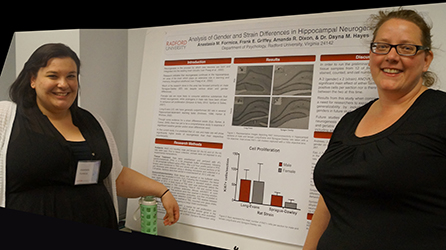| Hippocampal Neurogenesis in Rats: Gender and Strain Differences |
|
Anastasia Formica, Master’s in Psychology program,
Clinical-Counseling Psychology Concentration (Sponsoring faculty member: Dr. Dayna Hayes) |
 There
is a comprehensive body of research indicating that neuro-genesis, a
process by which new neurons are born and integrated into existing brain
circuitry, continues throughout adulthood. One of the primary regions
where this occurs is the hippocampus, which plays an extensive role in
learning and memory. Unfortunately, the majority of research in this
area has traditionally been done using male Sprague-Dawley rats despite
the fact that research suggests there are a multitude of differences
based on strain as well as gender. To date, no comprehensive studies
have examined whether significant baseline gender differences in
hippocampal neurogenesis exist. Thus, adult (~6.5 months old) male and
female Sprague-Dawley and Long-Evans rats were perfused without exposure
to experimental manipulations. Brains will be collected, sliced, and
stained for Ki67 immunoreactivity, a common indicator of the cell
proliferation phase of neurogenesis. Cells expressing Ki67 will be
counted and compared. It is expected that there will be significant
differences in neurogenesis between strains and between genders. The
results may indicate a need to expand the field and increase
generalizability by including various strains and both genders in future
research. There
is a comprehensive body of research indicating that neuro-genesis, a
process by which new neurons are born and integrated into existing brain
circuitry, continues throughout adulthood. One of the primary regions
where this occurs is the hippocampus, which plays an extensive role in
learning and memory. Unfortunately, the majority of research in this
area has traditionally been done using male Sprague-Dawley rats despite
the fact that research suggests there are a multitude of differences
based on strain as well as gender. To date, no comprehensive studies
have examined whether significant baseline gender differences in
hippocampal neurogenesis exist. Thus, adult (~6.5 months old) male and
female Sprague-Dawley and Long-Evans rats were perfused without exposure
to experimental manipulations. Brains will be collected, sliced, and
stained for Ki67 immunoreactivity, a common indicator of the cell
proliferation phase of neurogenesis. Cells expressing Ki67 will be
counted and compared. It is expected that there will be significant
differences in neurogenesis between strains and between genders. The
results may indicate a need to expand the field and increase
generalizability by including various strains and both genders in future
research.
|
| 2015-2016 Kemp Award Recipients' Research |
| Symposium Notice 2016 Keynote Speaker: Presentation Program-2016 Speakers Kemp Awards Oral-Poster Presentations |
|
Center Home Clinical-Counseling
Psychology Experimental
Psychology
Psychology
Women's Studies College of Humanities & Behavioral Sciences Radford University |
| Web page: w. andrew Last update September 15th, 2019 |